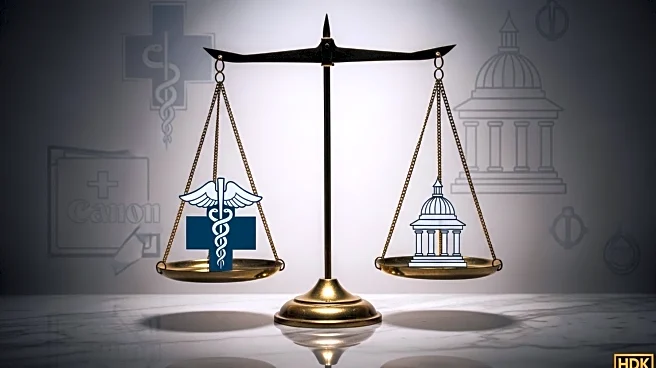What's Happening?
Congress is once again on the brink of a government shutdown as party leaders struggle to reach an agreement on a stopgap spending bill. The main point of contention is the extension of health care subsidies, which Democrats are demanding as part of the deal to keep the government open. Senate Majority Leader John Thune and other Republican leaders are advocating for a 'clean' bill without additional policy measures, while Democratic leaders Chuck Schumer and Hakeem Jeffries insist on including the subsidies. Historically, government shutdowns have been criticized for their negative impact on federal employees and the economy, with previous shutdowns often ending in last-minute compromises. The White House has prepared for potential layoffs of federal employees, marking a significant escalation from past shutdowns where workers were temporarily furloughed.
Why It's Important?
The looming government shutdown has significant implications for federal employees, who may face layoffs or furloughs, and for the broader U.S. economy. Shutdowns disrupt government services and can lead to delays in various sectors, including transportation and public safety. The political standoff also highlights the deepening partisan divide in Congress, which complicates the passage of essential legislation. If Democrats succeed in securing health care subsidies, it could bolster their standing with base voters who prioritize health care issues. Conversely, a shutdown could damage public perception of both parties, particularly if it leads to widespread disruption and economic consequences.
What's Next?
As the deadline approaches, both parties are likely to engage in intense negotiations to avoid a shutdown. Democrats may leverage the situation to push for additional policy measures, while Republicans will aim to pass a clean spending bill. The outcome will depend on whether either side is willing to compromise on key issues. If a shutdown occurs, it could lead to increased pressure on Congress to resolve the impasse quickly, especially as federal employees and services are affected. The political ramifications could influence upcoming elections and legislative priorities.
Beyond the Headlines
The potential shutdown raises ethical questions about the use of government employees as bargaining chips in political negotiations. It also underscores the challenges of governing in a highly polarized environment, where compromise is increasingly difficult to achieve. Long-term, repeated shutdowns could erode public trust in government institutions and lead to calls for reform in how budget negotiations are conducted.










